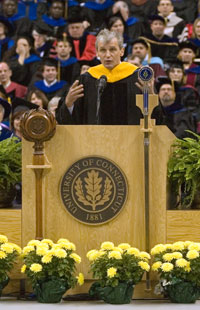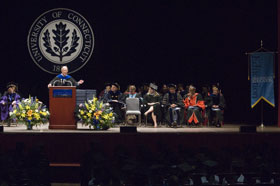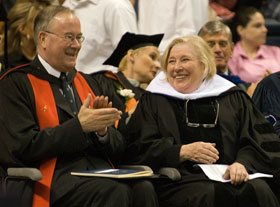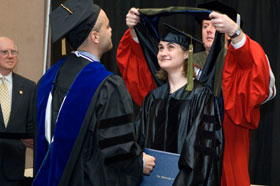  |
| HOME | THIS ISSUE | CALENDAR | GRANTS | BACK ISSUES | < BACK | NEXT > |
Graduation ceremonies celebrate students’ achievementsby Sherry Fisher& Elizabeth Omara-Otunnu - May 14, 2007 |
||||||||||||
| The best of both worlds is how Doctor of Pharmacy graduate Alison Smith describes her experience in the School of Pharmacy. “What I like best about the school is that in a huge university, it’s a very small community,” she says. “You know everyone in your class, and the faculty know you by name.” May 5, Smith graduated along with nearly 90 fellow Pharm.D. and 11 Ph.D. students in a ceremony in Rome Ballroom that combined a personal touch with the formalities of Commencement. With tables set for brunch and live music provided by three fine arts students, more than 600 family members and friends mingled with students, faculty, and staff of the pharmacy school. In previous years, the school offered brunch in the morning and then headed over to Gampel Pavilion for graduation. This year the brunch included an award ceremony; and the graduates received their actual diplomas. Robert McCarthy, dean of pharmacy, says only about a third of the school’s graduates participated in the event in Gampel, compared with about 80 percent taking part this year. McCarthy reminded the class of their collective accomplishments: fund raising for Xavier School of Pharmacy in the wake of Hurricane Katrina; building a fledgling student government into “an effective powerhouse;” representing the school at the dedication of the Pharmacy/Biology Building; and helping Connecticut residents choose a Medicare Part B plan. Keynote speaker Robin Bogner, an associate professor of pharmacy and the school’s 2007 Teacher of the Year, urged the graduates to be teachers. “The best way for you to treat your patients is to teach them,” she said, “so they can become participants in their own health care.” Don’t just provide information, go above and beyond, she added. Focus not just on patients and families, but on caregivers, technicians and support staff, and other pharmacists and health professionals. “You will affect the lives of people you will never meet,” she said. Pharmacy was one of three schools at Storrs that held separate ceremonies this year. The School of Fine Arts and the Neag School of Education staged their graduations in the Jorgensen Center for the Performing Arts May 6, with speakers Christopher Keen Donovan, ’69, an Emmy-nominated director and technical director, and philanthropist Ray Neag, ’56, respectively. The Pharm.D. students were the only ones this year to receive a genuine diploma on graduation day, rather than a diploma case. “It’s kind of cool,” said graduating student Richard Meinking, “after six years to actually get what we went to school for.” Undergraduate ceremonies “Empathy is simply the ability to understand what it’s like to be someone else,” she said, during her Commencement address to more than 3,200 undergraduates. “Without empathy, social and political cooperation between nations and peoples is a trudging, tragic business: With it, it’s a matter of easy common sense: the victory of good will.” Weldon was the speaker at twin ceremonies May 6 at Gampel Pavilion, where she was awarded an honorary Doctor of Humane Letters degree. Also honored was Mark Shenkman ’65, president and chief investment officer of Shenkman Capital Management Inc., who received an honorary doctorate of Humane Letters. Weldon, the mother of four grown sons and stepmother to three, said students have “weathered the dangers of growing up, got to college, stayed there, and won your just reward. “No one is going to say to you, at least today, you should have worked harder, spent less, gone to bed earlier, kept away from this boy, that girl, walked the dog more often, not treated this house as a hotel, or whatever – they are just going to say ‘well done.’ Weldon commended parents for their efforts, eliciting laughter and applause from the crowd. “On children’s birthdays,” she said, “it’s the parents who should get the flowers and the gifts ... the annual bonus for having survived another year bringing them up.”
To the students, she said that “older generations have bequeathed you something of a mixed inheritance, global warming, for example. But you come out of this splendid university, UConn: You are trained to think properly, feel sensitively, and you’ll cope.” She said students will want to find jobs that suit them, “without quite knowing what this is. ... Any job is better than none, and you never know what suits you until you try.” During the ceremonies, Provost Peter J. Nicholls announced this year’s University Teaching Fellows. John W. Rowe, chairman of UConn’s Board of Trustees, acknowledged President Philip E. Austin for his efforts during his 11-year tenure. Austin, who has resigned effective in September, received a standing ovation. Graduate ceremony Ketterle, who was born in Germany, received the Nobel Prize in Physics in 2001 at the age of 43 for work that expanded on the research of other physicists related to the condensation of atomic gas. He said that although he met with success early in his career, he did not always know what he wanted to do. He tried out theoretical physics, applied physics, molecular studies, and physical chemistry – where he made some contributions to improving the efficiency of combustion and reducing pollution. After moving to the U.S., Ketterle took up a new field, atomic physics. “I went from the study of hot flames to studies of the coldest matter in the universe,” he said. His first permanent position came at the age of 39, when he joined the faculty at MIT. Soon after, he discovered a new form of ultracold matter, called the Bose-Einstein condensate, which led to his winning the Nobel Prize. “I think it helped me to have entered my current field rather late,” Ketterle said. “When you switch fields … you try to understand and analyze the old questions of your new field with a mind which has been trained differently.” He drew an analogy with sailing: “In my life, I have changed direction several times, like in sailing when the winds change and you have to change your course. “You may reach a destination different from what you originally planned, but it may turn out well,” he added. Ketterle received an honorary Doctor of Science degree, as did John Krenicki, ’84, president and CEO of GE Energy. Also during the graduate ceremony, the recipients of the Provost’s Research Excellence Awards for 2006 and 2007 and this year’s Board of Trustees Distinguished Professors were recognized. | ||||||||||||
| ADVANCE HOME UCONN HOME |




